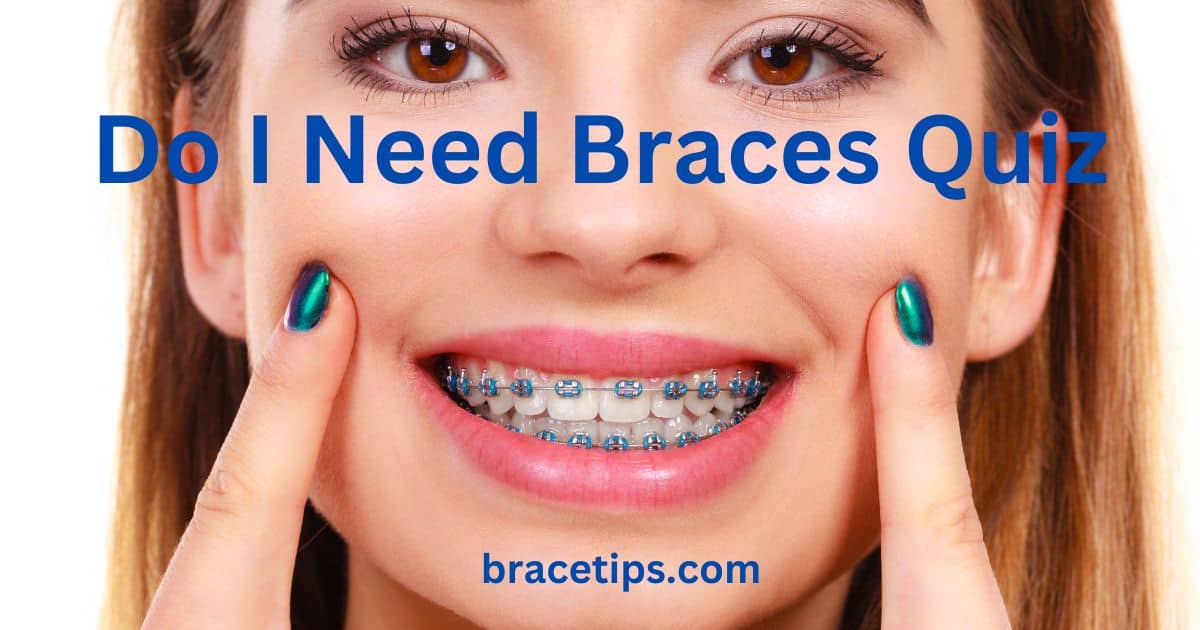Do I Need Braces Quiz
Braces a common orthodontic solution, can address issues like misaligned teeth, overcrowding, and bite irregularities. However, determining whether you need braces requires careful consideration and assessment. Orthodontic care is not just about achieving a picture-perfect smile. Braces play a crucial role in addressing various dental issues, from misaligned teeth to bite problems. Before diving into the quiz, let’s briefly explore common orthodontic problems.
Misaligned teeth, overcrowding, and bite issues can impact not only the aesthetics of your smile but also your overall oral health. Braces are designed to address these concerns and promote a healthier mouth. To simplify this decision-making process, we’ve crafted the ultimate do I need braces quiz. This comprehensive quiz, designed with your concerns in mind, covers various aspects of orthodontic needs, helping you understand if braces could be the key to unlocking your best smile.
Why Braces Matter
The Significance of Orthodontic Care
Orthodontic care isn’t merely about aesthetics; it plays a crucial role in oral health. Misaligned teeth can lead to various issues, including difficulty in cleaning teeth, jaw pain, and speech problems. Braces, as a corrective measure, aim to address these concerns, promoting not only a beautiful smile but also overall oral well-being.
Benefits of Braces Beyond Appearance
While a straighter smile is undoubtedly a confidence booster, the benefits of braces extend beyond cosmetic improvements. From improved oral hygiene to enhanced chewing functionality, braces can positively impact various aspects of your life. This quiz delves into these aspects, ensuring a holistic understanding of your orthodontic needs. Early detection of orthodontic issues brings a host of benefits. By addressing problems sooner rather than later, you can prevent more significant dental complications and enhance your facial aesthetics.
The Do I Need Braces Quiz
To provide you with a well-rounded assessment, our Do I Need Braces Quiz is structured to cover different dimensions of orthodontic concerns. Each section tackles specific aspects, ensuring a thorough evaluation of your individual needs. Let’s break down the key components:
Aligning Expectations
- Assessment of Tooth Alignment: Evaluate the current alignment of your teeth. This section explores the degree of misalignment and the potential impact on oral health.
- Functional Considerations: Delve into functional aspects, addressing concerns like difficulty in chewing, speech impediments, and any pain or discomfort in the jaw.
- Cosmetic Concerns: Explore your aesthetic preferences and the significance of a confident smile in your daily life.
- Age and Growth Factors: Consider how age and growth may influence the effectiveness of orthodontic treatment.
- Budget and Lifestyle: Assess the practical aspects, including budget constraints and lifestyle considerations, to determine the feasibility of orthodontic care.
Signs That You Might Need Braces
Wondering if braces are in your future? Look out for signs such as irregular teeth alignment, overcrowding, or spacing issues. Bite problems, including overbites and underbites, are also indicators that braces might be necessary.
A Self-Assessment Tool
To make the decision-making process easier, we’ve developed the Do I Need Braces Quiz. This self-assessment tool comprises carefully crafted questions that will help you gauge whether braces are the right choice for you.
Taking the Quiz
Taking the quiz is simple and informative. Answer each question thoughtfully, considering your current dental situation. Remember, this quiz is designed to provide insights, not a definitive diagnosis.
Interpreting Quiz Results
Once you’ve completed the quiz, you’ll receive results that fall into different categories. These categories will guide you on the next steps, whether it’s seeking professional consultation or understanding that braces may not be necessary at this time.
Consulting with an Orthodontist
While self-assessment is valuable, nothing beats the expertise of a professional orthodontist. If your quiz results suggest the possibility of needing braces, schedule a consultation to get personalized advice and recommendations.
Types of Braces Available
Should braces become a consideration, it’s essential to explore the options. Traditional metal braces are reliable, but alternatives like Invisalign offer a more discreet approach. The choices allows you to make an informed decision.
Assessing Your Need for Braces, A Step-by-Step Approach
Orthodontic Issues
Before diving into the quiz, it’s crucial to understand common orthodontic issues that braces can address. These include:
- Misaligned Teeth: Teeth that are crooked, rotated, or overlap.
- Overcrowding: Lack of space in the jaw, leading to teeth bunching up or overlapping.
- Malocclusion: Irregularities in the bite, such as overbite, underbite, or crossbite.
- Jaw Irregularities: Problems with the alignment or size of the jaw, leading to bite issues.
Self-Assessment
Initial Considerations
Do you experience difficulty chewing or biting?
- Yes
- No
Have you noticed any jaw pain or discomfort?
- Yes
- No
Are you experiencing speech difficulties due to dental issues?
- Yes
- No
External Examination
Observing Visible Signs
Do you have visibly crooked or misaligned teeth?
- Yes
- No
Are there gaps or spaces between your teeth?
- Yes
- No
Do your upper and lower teeth meet correctly when you bite down?
- Yes
- No
Consultation with a Dental Professional
Have you consulted with an orthodontist or dentist regarding your concerns?
- Yes
- No
Has a dental professional recommended braces or orthodontic treatment for you?
- Yes
- No
How would you describe the alignment of your teeth?
- a) My teeth are perfectly aligned.
- b) I have minor irregularities but nothing significant.
- c) My teeth are noticeably crooked or misaligned.
Do you experience any discomfort or pain related to your jaw or teeth?
- a) No, I don’t experience any discomfort.
- b) I experience occasional discomfort but nothing severe.
- c) Yes, I frequently experience pain or discomfort.
Have you noticed any difficulties with chewing or biting?
- a) No, I can chew and bite without any issues.
- b) Occasionally, I encounter difficulties, but it’s manageable.
- c) Yes, I struggle with chewing or biting effectively.
Have you received recommendations for braces or orthodontic treatment from a dental professional?
- a) No, I haven’t received any recommendations.
- b) I’ve been advised to consider orthodontic treatment but haven’t decided yet.
- c) Yes, a dental professional has recommended braces or orthodontic treatment for me.
Myths About Braces Debunked
Before making a decision, let’s dispel common myths surrounding braces. From discomfort to appearance concerns, many misconceptions exist. In reality, braces have evolved, and modern options address these issues effectively.
Braces and Lifestyle
Curious about how braces might impact your daily life. From eating habits to oral hygiene routines, we’ll explore the practical aspects of incorporating braces into your lifestyle.
Cost Considerations
Financial concerns often play a role in decision-making. We’ll break down the factors influencing the cost of braces and discuss potential insurance coverage options, ensuring you have a comprehensive.
Patient Success Stories
To provide a real-world perspective, we’ve gathered stories from individuals who have undergone orthodontic treatment. Their experiences highlight the positive transformations that braces can bring, inspiring confidence and well-being.
Crunching the Numbers for Orthodontic Success
To provide a personalized recommendation, our quiz includes a calculation section. This involves assigning scores based on your responses in each category. Here’s a brief overview of the scoring system:
- Tooth Alignment Assessment: Score range of 1-10 based on the degree of misalignment.
- Functional Considerations: Score range reflecting the severity of functional issues.
- Cosmetic Concerns: Weighted scoring based on the importance you assign to aesthetic improvements.
- Age and Growth Factors: Adjusted scoring considering the influence of age on orthodontic outcomes.
- Budget and Lifestyle: Practical scoring based on the alignment of your preferences with available options.
FAQ Section
Q: Do braces hurt?
A: Discomfort is normal initially, but it lessens over time as your mouth adjusts.
Q: Can I still play sports with braces?
A: Yes, but wearing a mouthguard is advisable for protection.
Q: Are there age restrictions for getting braces?
A: No, people of all ages can benefit from orthodontic treatment.
Q: Can I choose the color of my braces?
A: Yes, many orthodontic practices offer a variety of colors for braces.
Q: Are Braces Only for Cosmetic Purposes?
A: While braces do enhance the aesthetic appeal of your smile, they also address functional issues such as misalignment, difficulty in chewing, and speech problems.
Q: How Long is the Typical Treatment Duration?
A: The duration of orthodontic treatment varies depending on the severity of the case. On average, it can range from a few months to a few years.
Q: Are There Alternatives to Traditional Braces?
A: Yes, alternatives like clear aligners exist. The suitability of options depends on individual cases, and discussing alternatives with an orthodontic professional is crucial.
Conclusion
The decision to get braces is a personal one, guided by various factors. Whether addressing aesthetic concerns or enhancing oral health, braces can be a transformative journey. Take charge of your dental well-being, and remember, professional guidance is just a consultation away. The pursuit of a confident smile, the decision to get braces is a significant one. Our Do I Need Braces Quiz serves as a comprehensive guide, addressing your concerns from various angles. Remember, orthodontic care is not just about the appearance of your smile, it’s about fostering optimal oral health and overall well-being. Take the quiz, uncover your orthodontic needs, and embark on a journey towards a healthier, more confident you.
Determining whether you need braces involves a combination of self-assessment, professional consultation, and careful consideration of various factors. By addressing concerns related to tooth alignment, discomfort, appearance, and professional recommendations, you can make an informed decision about pursuing orthodontic treatment.

